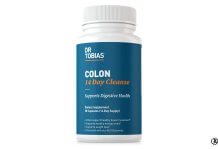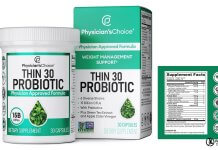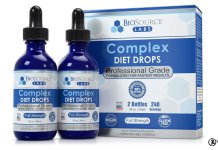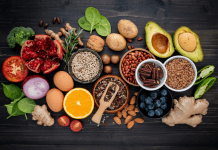I get commissions for purchases made through links on the site. As an Amazon and Clickbank Associate I earn from qualifying purchases. Learn more.
A healthy diet incorporates nutrient-dense foods from all major groups, including healthful fats, whole grains, lean proteins, vegetables, and fruits. Also, healthy eating means replacing unhealthy foods that contain sugar, trans fats, and added salt with more nutritious foods. Is healthy diet important? Based on science, a healthy diet has an array of benefits, including boosting mood, preventing chronic diseases, building strong bones, and improving heart health. In addition, eating a healthy diet plays a significant part in boosting your health and overall well-being. Without a healthy, balanced diet, your body is more prone to chronic health issues like cancer, diabetes, and heart disease. According to some studies, consuming an unbalanced diet is vital in declining your nutrient level. This increases your risk of vitamin deficiency. There are numerous dangers of nutrient deficiency, including skin problems, anemia, and digestion problems. Below are reasons why healthy diet is important:
Estimated reading time: 10 minutes
Table of contents
- Daily Greens – Organic Superfood Powder Formula – The 34 organic superfoods and the presence of 11 extracts and herbs in the Daily Greens powder make it the worlds’ super healthiest food for health lovers.
Reduces the Risk of Cancer
Currently, most people are struggling with cancer due to lifestyle changes. Unhealthy foods and habits play a vital role in increasing cancer risk. A healthy diet containing antioxidants can lower your odds of developing cancer. Antioxidants protect your cells from damage. Free radicals in the body can increase your risk of cancer, especially in the long run. Antioxidants eliminate free radicals, thus lowering your likelihood of developing chronic illnesses. Many phytochemicals found in legumes, fruits, nuts, and vegetables act as an antioxidant, including vitamin A, lycopene, vitamin C, beta-carotene, and vitamin E. Below are some of the foods with high antioxidant content:
- Seeds and nuts
- Dark leafy greens
- Berries, including raspberries and blueberries
- Carrots and pumpkin
Obese individuals are more prone to cancer. Therefore, you should manage your weight properly in order to minimize your chances of developing cancer. Some studies show that a fruit-rich diet can lower the risk of upper gastrointestinal tract cancer. In addition, a diet rich in vegetables can reduce the risk of colorectal cancer, while a diet rich in fibers can lower the risk of liver cancer.
Weight Loss
Most people are struggling with obesity and being overweight. There are numerous ways of maintaining a healthy weight, including eating a healthy diet and working out on a regular basis. Being physically fit can lower your odds of developing chronic health problems. Obese and overweight individuals are prone to diseases such as:
- Some cancers
- Type 2 diabetes
- Cardiovascular health issues
- Poor bone density
Many healthy foods, including beans, vegetables, and fruits, are lower in calories, particularly when compared to processed foods. To track your calorie intake, create an eating journal or a menu. In addition, you can use calorie counter apps to monitor your progress. Eating a healthy diet with dietary fiber can help you attain your weight loss goals. You can find fiber in fruits, vegetables, and plant-based foods. Consuming more fiber will reduce your hunger, thus lowering your risk of consuming junk and processed foods. There are various benefits of managing your weight: higher self-esteem, lower levels of triglycerides, healthy blood pressure, improved mobility, less risk of cardiovascular problems, and better sleep. A study showed that a diet rich in lean proteins and fiber resulted in weight loss without the need to track your calorie intake.
Boost Heart Health
Heart problems are associated with unhealthy eating and lifestyle. Based on studies, heart disease is among the leading causes of death. Individuals are struggling with different types of cardiovascular problems. In addition, hypertension or high blood pressure is another aspect that can increase your risk of developing heart failure, heart attack, and stroke. According to statistics, consumption of healthy foods can reduce premature stroke and heart disease by 80%. To obtain effective results, you should combine a healthy diet with exercise. The DASH diet can help you reduce the risk of hypertension. Below are some of the aspects that the DASH diet recommends:
- Limit trans and saturated fats intake, including full-fat dairy products and fatty meat.
- Eat plenty of whole grains, fruits, and vegetables.
- Limit foods and drinks that contain excess sugar content.
- Choose low-fat or fat-free fish, dairy products, vegetable oils, nuts, beans, and poultry.
- Reduce sodium intake and increase consumption of calcium, magnesium, and potassium
In addition, foods with high fiber intake can boost the health of your heart. Based on science, dietary fiber can help lower the risk of stroke, obesity, heart disease, type 2 diabetes, etc. Also, food rich in fiber can improve blood cholesterol. There’s a link between heart-related illnesses and trans fats. For instance, increased trans fat and other unhealthy fats can contribute to coronary heart disease. Limiting certain types of fats can boost your heart health. For instance, reducing trans fats intake can lower the levels of low-density lipoprotein cholesterol. According to science, this type of cholesterol can increase the risk of stroke and heart attack. Also, reducing blood pressure can help in promoting a healthy heart.
Improved Gut Health
The gut comprises bacteria, which play a vital role in digestion and metabolism. Certain strains of bacteria in the colon produce vitamin B and K, which fight harmful viruses and bacteria. A diet high in sugar and low in fiber can alter the gut microbiome, thus increasing inflammation. When left untreated, chronic inflammation can increase your risk for diseases like rheumatoid arthritis, heart disease, diabetes, and cancer. However, a healthy diet rich in fruits, vegetables, whole grains, and legumes provides a combination of probiotics and prebiotics that help gut bacteria thrive. Some of the fermented foods that are great sources of probiotics include kefir, yogurt, sauerkraut, kimchi, and miso. Fiber is an accessible prebiotic that’s found in fruits, grains, vegetables, and fruits. Increased fiber consumption can promote regular bowel movements, thus reducing the risk of diverticulitis and bowel cancer. Also, a healthy gut contributes to a strong immune system, effective digestion, and healthy sleep.
- 14 Day Rapid Soup Diet – With the Rapid Soup Diet, you will feel full for a long time with fewer calories than you ever thought possible. The rapid soup detox diet also detoxifies your lymphatic system, allowing your body to clean itself properly, and boosts your metabolism.
Strong Bones and Teeth
Magnesium and calcium are some of the key minerals of a healthy diet. These minerals are responsible for strong bones and teeth. Boosting the health of your bones can lower the risk of bone issues, including osteoporosis. Some of the foods that are rich in calcium include cabbage, low-fat dairy products, legumes, tofu, cauliflower, broccoli, and canned fish with bones. On the other hand, some of the foods that contain magnesium are whole grains, leafy green vegetables, seeds, and nuts. These minerals are incorporated into your bones during early adulthood, childhood, and adolescence. Other aspects that can increase bone mass include strength training and eating high-protein foods.
Improved Memory
A healthy, balanced diet can boost your brain and cognitive health. Some of the foods that’ll help you reduce the risk of dementia and cognitive decline include fish, polyphenols, omega-3 fatty acids, vitamin C, vitamin D, vitamin E, and flavonoids. In addition, the Mediterranean diet contains a diverse range of healthy foods. Therefore, it can help you improve your memory.
Better Mood
There’s a link between mood and diet. For instance, diets that contain high levels of glycemic can trigger depression, anxiety, and fatigue. Based on research, a diet with high glycemic levels may contain refined carbs, including white bread, biscuits, cakes, and soft drinks. On the other hand, foods such as whole grains, vegetables, and whole fruit have a low glycemic load. If you’re struggling with depression or anxiety, you should consult a professional medical practitioner.
Boosts Sleep
Most people are struggling with sleep disorders, including sleep apnea. These disorders can disrupt your sleep patterns, thus lowering the quality of your sleep. Some of the risk factors of insufficient sleep include alcohol consumption, unhealthy diet, obesity, and other bad habits. Reducing caffeine and alcohol intake can boost your sleep and maintain a healthy sleep routine.
Healthy Eating on a Budget
Eating healthily doesn’t have to be expensive. In fact, with some smart planning and strategies, you can maintain a nutritious diet while staying within your budget. Here are some tips for healthy eating on a budget:
- Plan Your Meals: Before you go shopping, make a meal plan for the week. This will help you buy only what you need and avoid impulsive purchases.
- Create a Shopping List: Based on your meal plan, create a detailed shopping list. Stick to the list when you’re at the store to avoid buying unnecessary items.
- Buy in Bulk: Purchase non-perishable items like grains, legumes, and canned goods in bulk. This is often more cost-effective in the long run.
- Choose Seasonal Produce: Seasonal fruits and vegetables are usually cheaper and fresher. Explore local farmers’ markets for even better deals.
- Opt for Frozen and Canned Produce: Frozen and canned fruits and vegetables are nutritious and have a longer shelf life. They are often more affordable than fresh produce.
- Use Store Brands: Many store brands offer quality products at lower prices compared to name brands. Check the labels for nutritional information.
- Cook in Batches: Prepare meals in larger quantities and freeze them in portions. This saves time and money in the long term.
- Limit Eating Out: Dining at restaurants or ordering takeout can quickly add up. Save eating out for special occasions and cook at home as much as possible.
- Reduce Meat Consumption: Meat is often one of the most expensive items in a grocery bill. Consider incorporating more plant-based protein sources like beans, lentils, and tofu into your meals.
- Minimize Processed Foods: Processed and convenience foods are usually more expensive per serving and less nutritious. Stick to whole foods and cook from scratch whenever you can.
- Compare Prices: Pay attention to unit prices on labels. Sometimes, buying a larger size is more cost-effective, but not always.
- Limit Snacking: Snacks can be pricey, both in terms of money and calories. Try to limit snacking and focus on satisfying meals.
- Avoid Sugary Drinks: Soft drinks and sugary beverages can be costly and offer little nutritional value. Opt for water, herbal tea, or homemade flavored water.
- Practice Portion Control: Be mindful of portion sizes to avoid food waste. Leftovers can often be used for future meals.
- Use Coupons and Discounts: Keep an eye out for coupons, discounts, and loyalty programs offered by your local grocery store.
Remember that healthy eating doesn’t have to be complicated or expensive. By planning your meals, making smart choices at the grocery store, and cooking at home, you can maintain a nutritious diet while staying on budget.
Frequently Asked Questions (FAQs)
Starchy foods, fruits, vegetables, proteins, and dairy products make up a healthy diet. You should limit the number of drinks or foods that are high in sugar or fat. In addition, you should replace saturated fat with healthy fats, including polyunsaturated fats. In order to attain a healthy lifestyle, you should limit the intake of ultra-processed foods. Healthy foods will boost your immune system, thus improving your overall health.
A healthy diet contains numerous nutrients, such as proteins, fiber, healthy fats, starchy carbohydrates, vegetables, fruits, and healthy fats. These nutritious foods will reduce the risk of chronic health issues, support normal growth, slow the aging process, and aid weight management. Some of the factors that determine the effectiveness of healthy eating are the degree of physical activity, gender, age, dietary customs, and lifestyle.
There’s no specific diet for diabetes. But, the foods that you take can influence how you manage diabetes. For instance, a healthy diet can help a diabetic individual:
– maintain a healthy weight
– Keep cholesterol and blood pressure within target ranges
– Manage blood glucose levels
– Prevent complications of diabetes
This is a diet high in trans-fats, sugars, saturated fats, and low fiber foods. A high intake of processed and fast foods can increase your risk of developing chronic health issues.
- The LeanBiome – The Lean Biome has been around since 2013 but is still one of the best selling supplements today. Read our detailed review to see why.
Conclusion
Healthy eating has numerous health benefits, including reducing the risk of type 2 diabetes, obesity, stroke, and heart disease. In addition, a healthy diet can boost your mood and the quality of sleep.



























